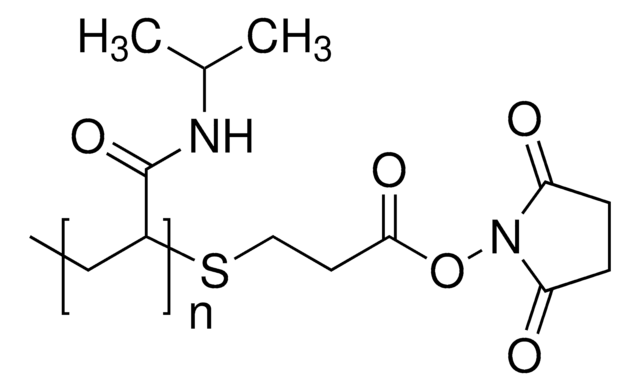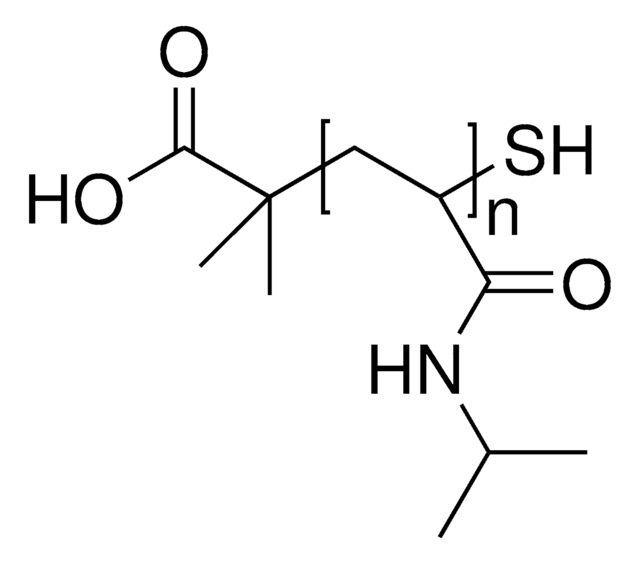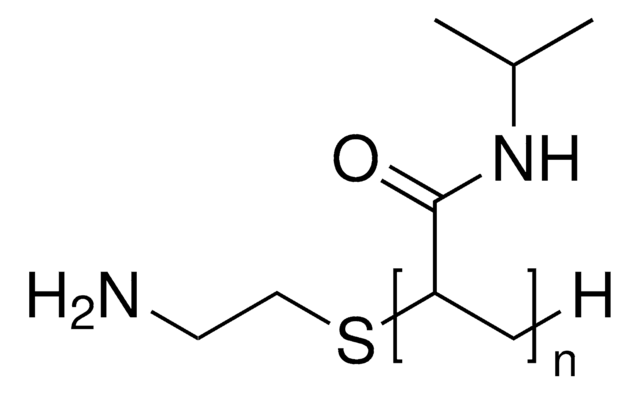900188
Poly(N-isopropyl acrylamide)
NHS ester end functionalized, average Mn 5,000
Synonym(s):
PNIPAM, polyNIPAM
Sign Into View Organizational & Contract Pricing
All Photos(2)
About This Item
Linear Formula:
C8H10NO4(C6H11NO)nH
UNSPSC Code:
12162002
NACRES:
NA.23
Recommended Products
Application
Poly(N-isopropyl acrylamide) (PolyNIPAM) is a stimuli-responsive polymer. This product features low polydispersity (PDI), which typically leads to better reproducibility in applications, and a terminal N-hydroxysuccinimide (NHS) functional group, allowing for rapid conjugation of biomolecules, small molecules, or other polymers. PolyNIPAM has been used in development of a variety of thermosensitive coated micro/nano materials, including thermoresponsive polymeric drug delivery systems.
Storage Class Code
11 - Combustible Solids
WGK
WGK 3
Flash Point(F)
Not applicable
Flash Point(C)
Not applicable
Choose from one of the most recent versions:
Certificates of Analysis (COA)
Lot/Batch Number
Don't see the Right Version?
If you require a particular version, you can look up a specific certificate by the Lot or Batch number.
Already Own This Product?
Find documentation for the products that you have recently purchased in the Document Library.
Yan Xia et al.
Chemical communications (Cambridge, England), 49(25), 2566-2568 (2013-02-21)
Site-specific protein conjugates with RAFT polymers were synthesized using expressed protein ligation. Stable micelles were formed from both linear block copolymer and Y-shaped conjugates.
Aniket S Wadajkar et al.
Acta biomaterialia, 8(8), 2996-3004 (2012-05-09)
New magnetic-based core-shell particles (MBCSPs) were developed to target skin cancer cells while delivering chemotherapeutic drugs in a controlled fashion. MBCSPs consist of a thermo-responsive shell of poly(N-isopropylacrylamide-acrylamide-allylamine) and a core of poly(lactic-co-glycolic acid) (PLGA) embedded with magnetite nanoparticles. To
A Gutowska et al.
Journal of biomedical materials research, 29(7), 811-821 (1995-07-01)
Biomer/poly(N-isopropylacrylamide)/[poly(NiPAAm)] thermosensitive polymer blends were prepared and their application as heparin-releasing polymer coatings for the prevention of surface-induced thrombosis was examined. The advantage of using poly (NiPAAm)-based coatings as heparin-releasing polymers is based on the unique temperature-dependent swelling of these
Avraham Halperin et al.
Langmuir : the ACS journal of surfaces and colloids, 28(48), 16623-16637 (2012-11-06)
Thermoresponsive tissue culture substrates based on PNIPAM brushes are used to harvest confluent cell sheets for tissue engineering. The prospect of clinical use imposes the utilization of culture medium free of bovine serum, thus suggesting conjugation with adhesion peptides containing
Shahrzad Rayatpisheh et al.
Macromolecular bioscience, 12(7), 937-945 (2012-04-27)
A new method for ultrathin grafting of pNIPAm on PDMS surfaces is introduced that employs plasma activation of the surface followed by thermal polymerization. This method is optimized for human primary SMC attachment and subsequent intact cell sheet detachment by
Articles
Professor Mitsuhiro Ebara provides insights on several types of smart nanofiber mesh systems that have been explored for different drug delivery purposes.
Our team of scientists has experience in all areas of research including Life Science, Material Science, Chemical Synthesis, Chromatography, Analytical and many others.
Contact Technical Service







